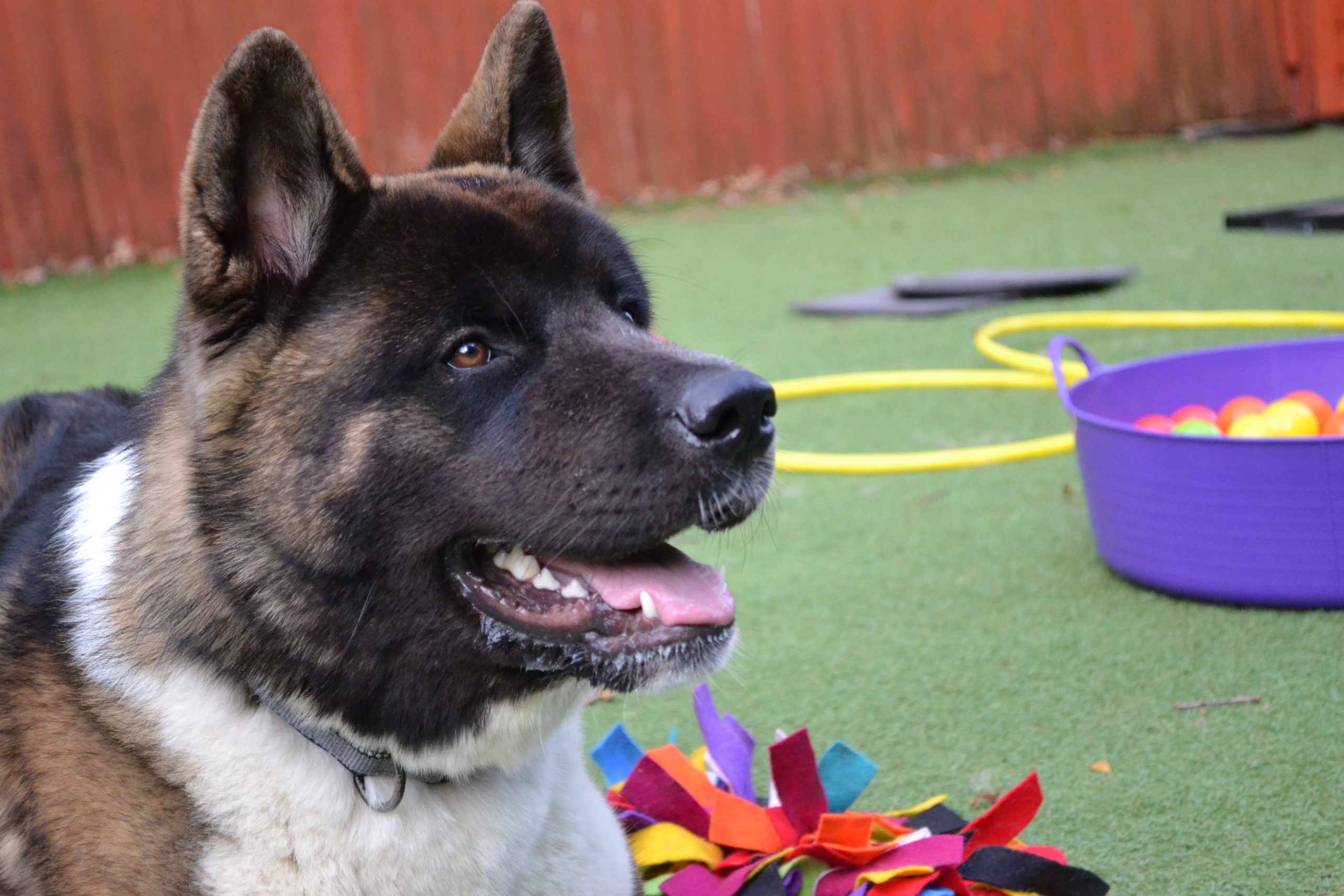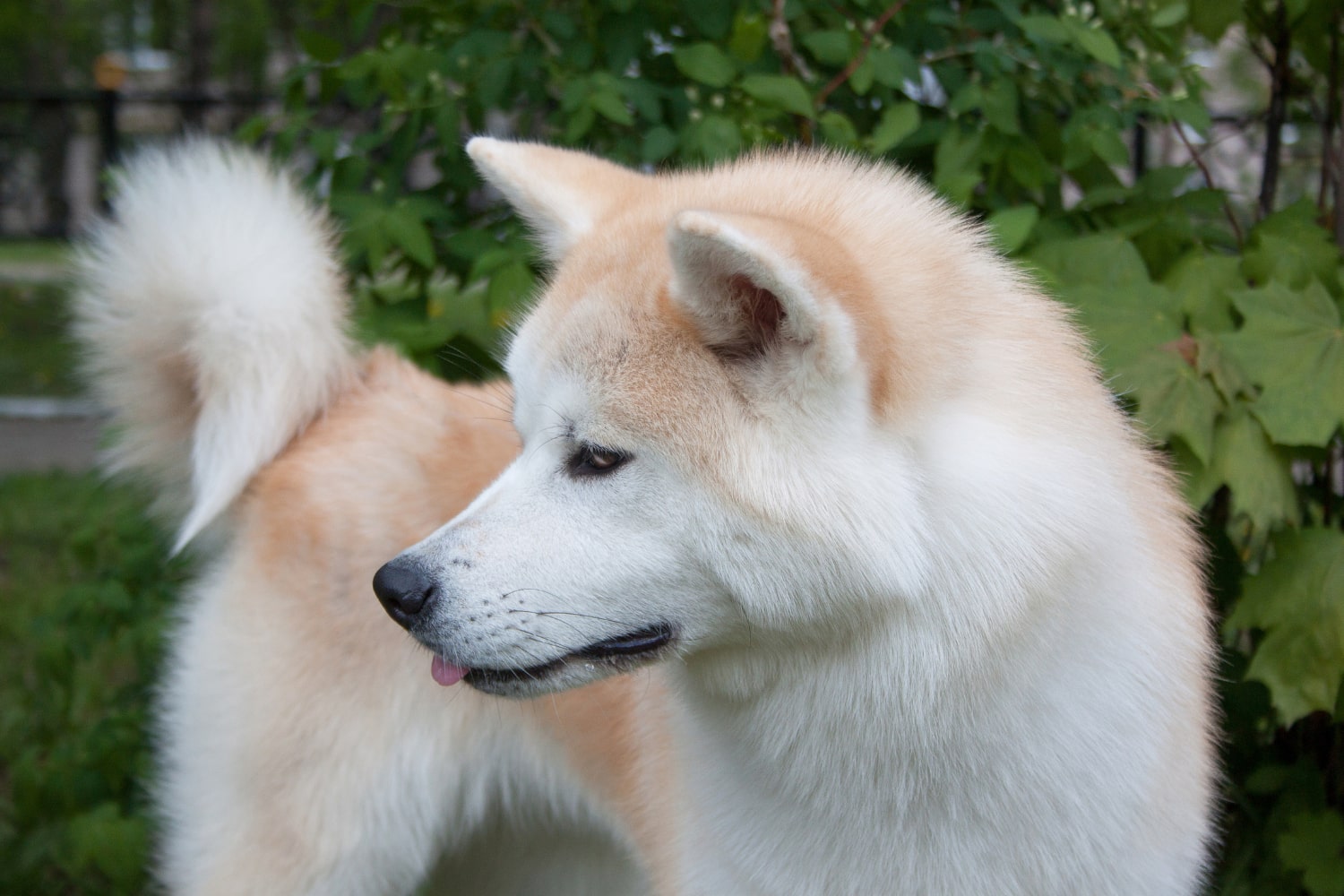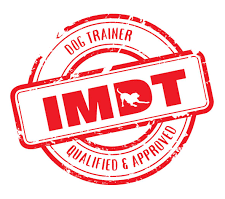Akita are a powerful, independent and dominant breed of dog with many doting fans around the world. As they were historically used for hunting wild boar, deer and bears, these dogs can hold their own in virtually any situation. With such an independent, large, and fearless dog, confident and consistent leadership is needed to keep your Akita from testing you and everything around you. Further to this, good and consistent Akita training is needed to ensure that there’s harmony in the home if you choose this dog breed. In this article, we’ll go through some of the things you should know about this majestic breed, as well as our top tips for training and owning them.
What do I need to know about Akitas?
It’s important to know that Akitas are not that interested in being around other dogs. In fact, they can often show signs of aggression, especially if they haven’t been socialised properly from an early age. In general, they tend to be happier being an only dog or, at best, living in pairs with another Akita. Also, bear in mind that this breed can have problems with dogs of the same sex and with other animals. So, early exposure and socialisation as a big part of their training and is very important.
While they are often aloof with strangers as a breed, they are very affectionate and protective over their family. And they are generally good with children, as long as the children don’t see the dog as a giant toy. But, with the right socialisation and strong leadership, you can have a great companion that is very loyal and loving. This is reflected in the fact that Akitas are often used as therapy dogs with both the elderly and children.
Akitas are very competitive
Akitas are a versatile breed. As a result, they are a popular breed in dog competitions. They’re capable of competing in many arenas including Schutzhund, tracking trials, and agility. Creating a strong bond and showing good consistent leadership is the key to having a successful relationship with your Akita. A mutual respect between dog and owner is definitely needed. This involves respect from you, as they are powerful and potentially dangerous if in the wrong hands, and respect from the dog as they will need to listen to you and follow your instructions when asked.
Akitas don’t like to be alone
Another important thing to bear in mind is that this breed can become anxious when left alone. They definitely like a companion, and if you are away for a long time, this can cause anxious and destructive behaviour. So, it’s important not to leave your Akita alone for long periods of time. You should also engage them with mental stimulation to flex their intelligent mind. Otherwise, whining and chewing will start to occur. This breed can make amazing family dogs that everyone will enjoy spending time with, as long as they are in the right, capable hands!

Akita training: Our Top 10 tips
Stay confident
As an owner, it’s important that you stay confident and consistent in your handling and training of your Akita. This is because they are a strong-headed breed and need rules to thrive.
Socialisation is key
It’s vital to socialise your Akita with other dogs from an early age, especially those of the same sex. You also need to make sure that they socialise with other animals, such as cats, as much as possible. Doing this ensures that they get used to other animals from a young age and are far less likely to have aggressive issues with them in the future.
Stimulate their brain!
Akitas are a highly intelligent breed, and giving them a job to do can help to stimulate them mentally and help to settle them. This will also make your Akita training easier, as they will be more mentally stimulated and happier to follow your direction. You can involve giving them a job in your day-to-day training. Games such as tossing a treat for them to catch or tug of war are good examples of this.
Respect goes both ways
When it comes to Akitas, it’s important to earn their respect. They can be an assertive breed. But respect goes both ways. So, having a healthy level of respect between the two of you will keep them from testing you. But consistency is needed. Before you get an Akita, you need to make sure that you are ready to make the commitment to be firm and consistent. However, if you are ready to do this, the rewards can be huge, and you should enjoy a happy relationship with your dog for years to come!
One person dog
It’s important that you don’t leave this breed alone for long periods of time. Encourage your Akita to get along well with the whole family and anyone else who may frequently be visiting. This is because Akita usually bond with only one person and can become anxious and stressed when that person is away. However, there is no denying that they can be a needy breed that loves human attention, so be prepared for this before you get one!
Teach your children to be around Akita
They are good with children as long as the children treat the dog with respect and don’t climb all over them. For this reason, they tend to be better pets for older children who are perhaps experienced in being around dogs and know how to behave properly around them. Because of their size, they can be frightening to smaller children, even if they do have a calm temperament.
Tame its power
Power is an Akita’s middle name. Versatile in all realms, from agility to mental ability. That’s why practising something new and active usually finds hidden talents during your Akita training routines! This will also help to give them enough mental and physical stimulation so they can thrive and be calm family pets. It also gives you something to enjoy doing together, which will help your relationship blossom throughout your dog’s lifetime.
They can be standoffish
This breed does have a reputation for being standoffish. So, it’s a good idea to introduce them to plenty of strangers when they are young. This will help to quell their natural standoffish behaviour with people whom they don’t know. If you want a social dog that you can take out and about with you, working on their standoffish behaviour is vital, as it will make this a whole lot easier for you!
Tips for Akita grooming
Regular grooming is required as Akitas can shed a lot. They’re a high-maintenance breed. So, if you’re looking to add an Akita to your family, be prepared for their hair to cover basically every surface. Keeping up with the cleaning may be quite difficult, so it’s up to you whether you would like to deal with this in your day-to-day life.
Change perceptions!
Some people may have a negative perception of Akitas because of their size and reputation for being a standoffish breed. But, with proper training and working consistently with your Akita, there’s no reason why you can’t show everybody how great these loving dogs can be! All it takes is a combination of the right positive training methods, respect, and consistency to help this breed really shine.
Training this powerful breed
Meet Blu, a furry giant of an American Akita. Blu was a student at Royvon for the residential Behaviour Modification Programme because he was showing aggression towards other dogs. One of our expert dog trainers, Ross, worked with Blu during his three-week stay to socialise him on-site at Royvon and offsite to be able to correct his behaviour. Ross worked on teaching Blu how to peacefully approach other dogs so Blu would stop rushing over and charging them. As we present to you in this video, watch Blu during his departure lesson, where Ross teaches the owners the positive dog training method that he used to accomplish more than positive results.
As with any breed, Akitas can develop negative habits if they’re not trained correctly from a young age. This includes everything ranging from being standoffish to severe anxiety and aggression. Here at Royvon, we have dedicated Akita training programmes developed over our 60-plus years in business, helping them to grow into the family pets their owners have dreamed of.
This method works for all sorts of breeds and not just Akitas! However, aggression is a typical issue we see with this breed that often results from the incorrect training methods being used early in the dog’s life. However, we will always work with a dog and their unique needs to come up with a training programme that works for them.
Train your dog with Royvon
We work with all breeds, personalities, and sizes here at Royvon! We’ve seen dogs with all sorts of issues, from puppies who need to learn basic manners to adult dogs with severe anxiety and aggression problems. You can find out more about what we offer and the different programmes by visiting our residential training page or by getting in touch today.





Leave A Comment